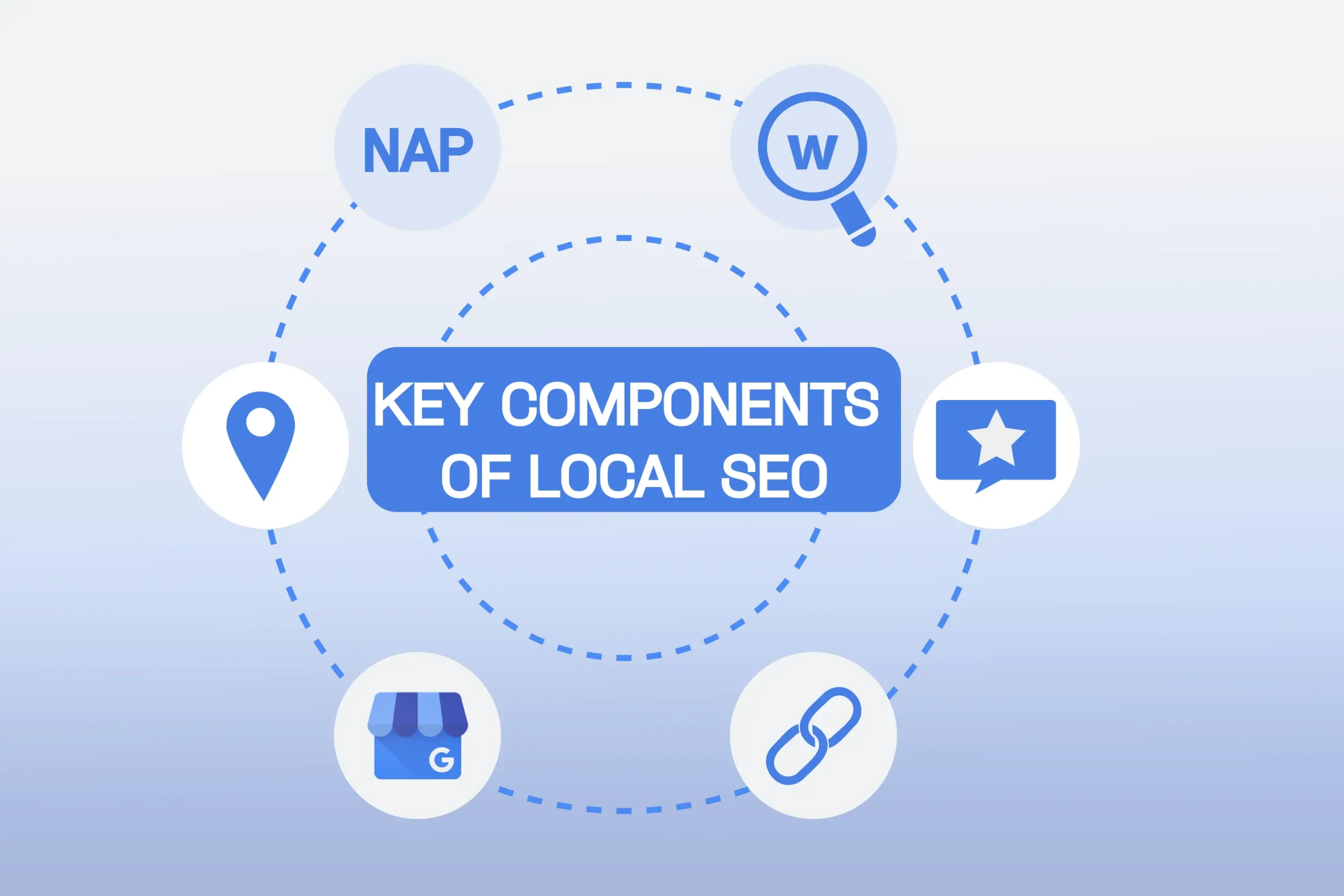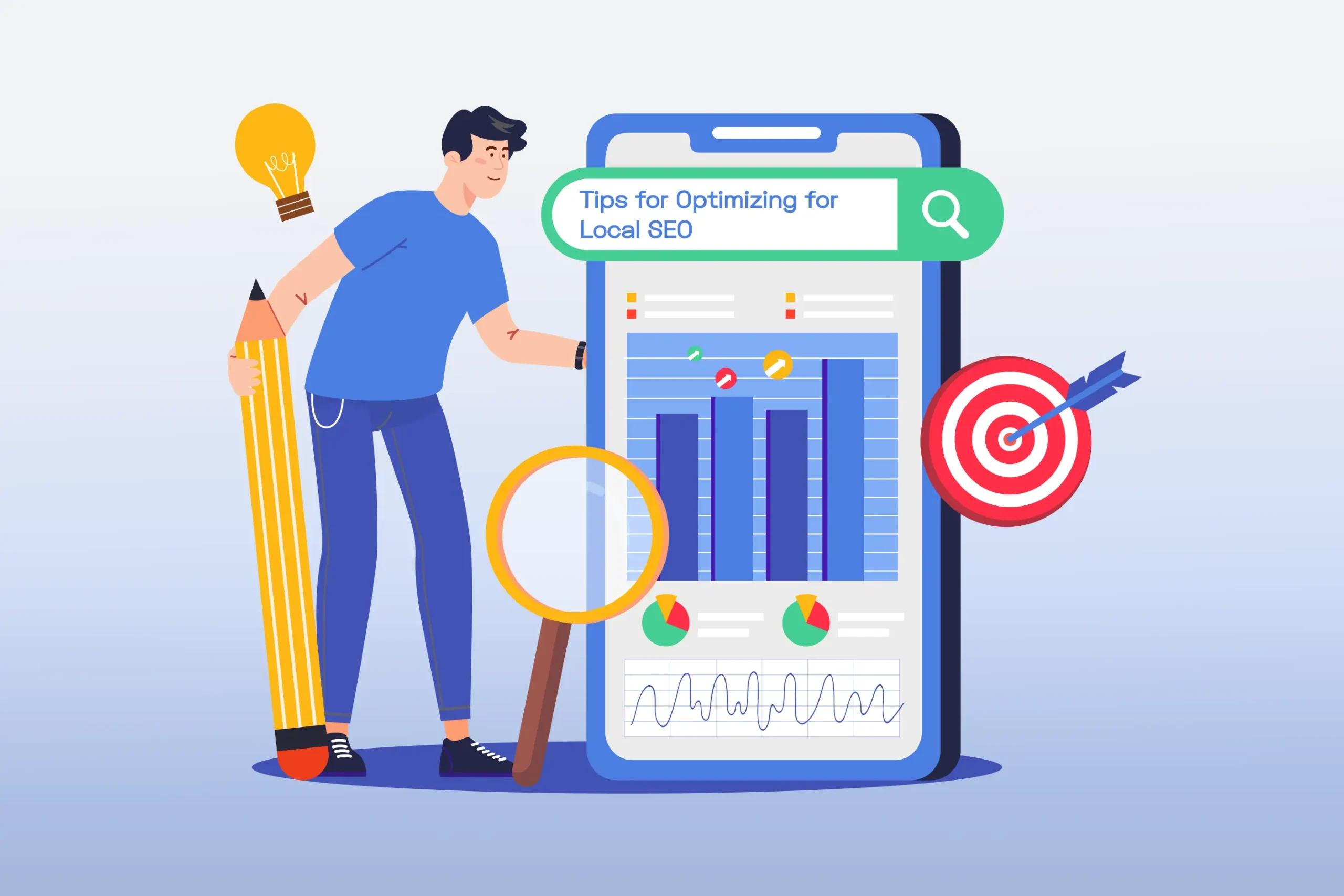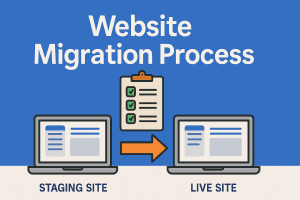Imagine searching for a cozy café or a reliable plumber in your neighborhood. You probably reach for your phone, type in a few words, and within seconds, a list of local businesses appears at your fingertips. That’s the power of local SEO at work.
In a world where nearly half of all Google searches are looking for local information, businesses that optimize their online presence for local search can tap into a goldmine of potential customers. Local SEO isn’t just about showing up online; it’s about showing up where it matters most—right in your community. According to a study by Google, 76% of people who conduct a local search on their smartphone visit a physical place within 24 hours and 28% of those searches result in a purchase. Indeed, with the rise of mobile searches, local SEO has become even more important, as people increasingly search for nearby options while on the go.
Whether you’re a brick-and-mortar store or a service provider, mastering local SEO can be the key to driving foot traffic, building trust, and growing your business. This guide will walk you through the essentials of local SEO, why it’s critical for your business, and how you can start making an impact today.
What is Local SEO? Key Components of Local SEO

Local SEO focuses on optimizing a business’s online presence to attract more customers from relevant local searches. Unlike general SEO, which targets a global audience, local SEO zeroes in on searches within a specific geographical area. Here are the key components of local SEO:
How Does Local SEO Differ from Non-Local SEO?
– Google Maps Pack: Local SEO efforts often target inclusion in the Google Maps pack, which showcases the top three local businesses related to a search query. Non-local SEO typically aims for organic search results.
– Importance of NAP: NAP (Name, Address, Phone number) information is crucial for local SEO. Search engines use this information to determine your business’s location and display it in local search results. While NAP information is still important for non-local SEO, it is not as critical.
– Local Citations: Unlike general SEO, local SEO heavily relies on citations in local directories, which are not as crucial in broader SEO strategies.
– Online Reviews: Reviews play a more significant role in local SEO, as they directly impact your visibility in local search results.
Why Local SEO Matters for Business
Local SEO is not just a marketing trend; it’s a powerful strategy that can make or break a business in today’s highly competitive digital landscape. As more consumers turn to search engines to find local products and services, businesses that optimize their online presence for local search can gain a significant edge over their competitors. Here’s why local SEO matters for your business:

1. Increased Visibility in Local Searches:
Local SEO helps your business appear in search results when potential customers in your area are looking for the products or services you offer. With nearly 46% of all Google searches having local intent, according to Google, being visible in local search results can drive more traffic to your website and physical location. Appearing in the coveted “local pack” or on Google Maps can significantly boost your visibility, making it easier for customers to find and choose your business over others.
2. Higher Conversion Rates:
Local searches often have high conversion rates because they are typically conducted by users with strong purchase intent. For example, someone searching for “best coffee shop near me” is likely looking to make a purchase soon. By optimizing for local SEO, you’re more likely to attract these high-intent customers, leading to more in-store visits, calls, and sales.
3. Builds Trust and Credibility:
A strong local SEO strategy involves garnering positive reviews and maintaining a consistent presence across various online platforms. When potential customers see your business has good reviews and is consistently listed across the web, it builds trust and credibility. This trust can be a deciding factor in whether a customer chooses your business over a competitor.
4. Cost-Effective Marketing:
Compared to traditional advertising methods, local SEO is cost-effective and delivers a higher return on investment (ROI). It targets customers who are actively searching for your products or services, ensuring that your marketing efforts reach the right audience at the right time. By investing in local SEO, you can achieve long-term visibility and sustained growth with a smaller budget.
5. Competitive Advantage:
Finally, local SEO provides a competitive advantage, especially for small and medium-sized businesses. Larger companies may dominate global search results, but local SEO levels the playing field by allowing smaller businesses to compete for local customers. By focusing on local SEO, you can establish your business as a local authority, attract more customers, and outshine competitors who neglect this crucial strategy.
Tips for Optimizing for Local SEO
Optimizing for local SEO involves a strategic approach that covers various aspects of your online presence. By focusing on these key areas, businesses can improve their visibility in local search results, attract more customers, and ultimately drive more sales. Here are some essential tips for optimizing your local SEO:

1. Conduct Thorough Research:
Before diving into local SEO optimization, it’s crucial to conduct thorough research. Start by identifying the most relevant keywords for your business and location. Use tools like SEMrush, Ahrefs, Mangools or Google Keyword Planner to discover the keywords your business is already ranking for, as well as those that your competitors are targeting. Look for gaps where you can improve or capitalize on untapped keywords that could drive more local traffic. Additionally, analyze your competitors’ backlink profiles to find opportunities for link building that can boost your local SEO.
2. Perform a Technical SEO Audit:
A technically sound website is the foundation of any successful SEO strategy. Conduct a technical SEO audit using tools like Screaming Frog or Google Search Console to identify and fix issues that could hinder your local search performance. Focus on crawling your website to check for broken links, duplicate content, slow-loading pages, and any other issues that could negatively impact user experience. Pay special attention to page speed and core web vitals, as these are not only important for user satisfaction but are also ranking factors in Google’s algorithm. You can use Google PageSpeed Insights to analyze and improve these metrics.
3. Optimize Your Content:
Content optimization is a critical component of local SEO. Begin by categorizing and prioritizing keywords based on their relevance to your business’s core services and location. Ensure that your content is tailored to local search intent by including location-specific keywords naturally within your text, headings, and meta descriptions.
Utilize tools like SEMrush, Mangools, Google Keyword Planner, and Moz Keyword Explorer to identify high-impact keywords. Additionally, take advantage of technologies such as RankBrain or NLP (Natural Language Processing) keywords to align your content with how search engines understand and rank local content. Make sure that each page is focused on a single primary keyword to avoid keyword cannibalization, which can dilute your ranking potential.
4. Build High-Quality Local Backlinks:
Backlinks from reputable local websites are a powerful signal to search engines that your business is authoritative and relevant within your community. Create linkable assets such as data-driven reports, guides, or infographics that provide value and are likely to attract backlinks naturally. Engage in digital PR and expert commentary to secure high-authority backlinks from local news outlets, blogs, or industry publications. Additionally, consider sponsoring local events or organizations, as these sponsorships can lead to valuable local backlinks that boost your SEO efforts.
5. Optimize Your Google Business Profile (GBP):
Your Google Business Profile is one of the most critical elements of your local SEO strategy. Ensure that your GBP is fully optimized with accurate and up-to-date information, including your business name, address, phone number, and hours of operation. Choose the most relevant categories for your business, add high-quality images, and regularly update your profile with posts and special offers to engage with your audience. Encourage satisfied customers to leave positive reviews on your GBP, as these reviews can significantly impact your local search rankings and help build trust with potential customers.
6. Ensure NAP Consistency Across All Platforms:
Consistency is key when it comes to your business’s Name, Address, and Phone number (NAP) across all online platforms like websites, social media or e-commerce platforms. Inconsistent NAP information can confuse search engines and users, leading to lower rankings and a loss of trust. Audit all online directories, your website, and your Google Business Profile to ensure that your NAP information is consistent and correct everywhere it appears. This will help reinforce your business’s legitimacy and improve your local search rankings.
7. Manage Online Reviews and Reputation:
Online reviews play a significant role in local SEO. Encourage your customers to leave positive reviews on platforms like Google, Yelp, and TripAdvisor. Responding to reviews, whether positive or negative, shows that you value customer feedback and are committed to providing excellent service. A strong online reputation not only boosts your local rankings but also increases the likelihood of attracting new customers. Additionally, managing and responding to reviews can provide valuable insights into customer preferences and areas for improvement.
8. Leverage Local Citations:
Local citations are mentions of your business’s NAP information on other websites, such as local directories, social media platforms, and industry-specific sites. Building and maintaining accurate citations can improve your local SEO by reinforcing your business’s credibility and relevance in local searches. Use tools like Moz Local or BrightLocal to manage your citations and ensure they are consistent across the web. Clean up any outdated or incorrect information, as inconsistent citations can negatively impact your local SEO efforts.
9. Optimize for Mobile Search:
With the growing use of smartphones, optimizing for mobile search is crucial for local SEO. Ensure that your website is mobile-friendly, with responsive design, fast load times, and easy navigation. A mobile-optimized site enhances user experience and increases the likelihood that visitors will stay on your site and engage with your content. Additionally, since many local searches are conducted on mobile devices, having a mobile-friendly site can improve your chances of ranking higher in local search results.
10. Utilize Structured Data Markup:
Structured data markup, or schema markup, helps search engines understand the content of your website better, leading to improved visibility in search results. Implement local business schema on your website to provide search engines with detailed information about your business, such as your name, address, phone number, operating hours, and services offered. This can enhance your chances of appearing in rich snippets, which can increase your click-through rates and drive more traffic to your site.
Conclusion

Local SEO is more than just a digital marketing strategy; it’s a crucial tool for businesses aiming to thrive in their local communities. By optimizing your online presence, you can increase your visibility, build trust, and attract high-intent customers who are ready to engage with your business. Whether you’re a small local shop or a service provider, investing in local SEO can help you stay ahead of the competition and ensure sustained growth. Start implementing these strategies today and watch your business become a go-to choice in your area.







